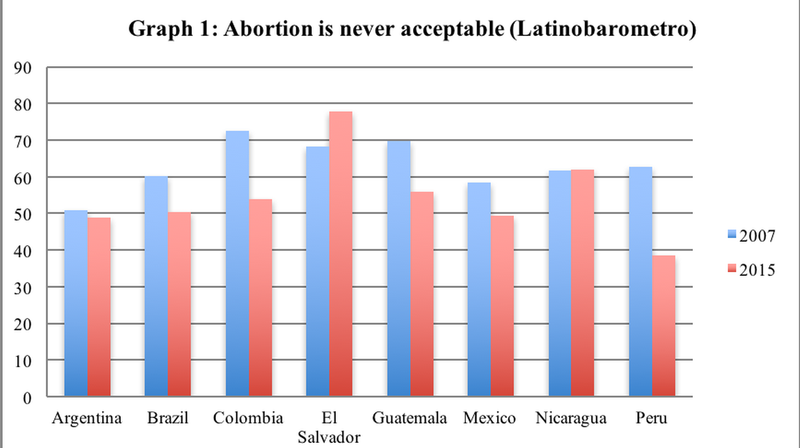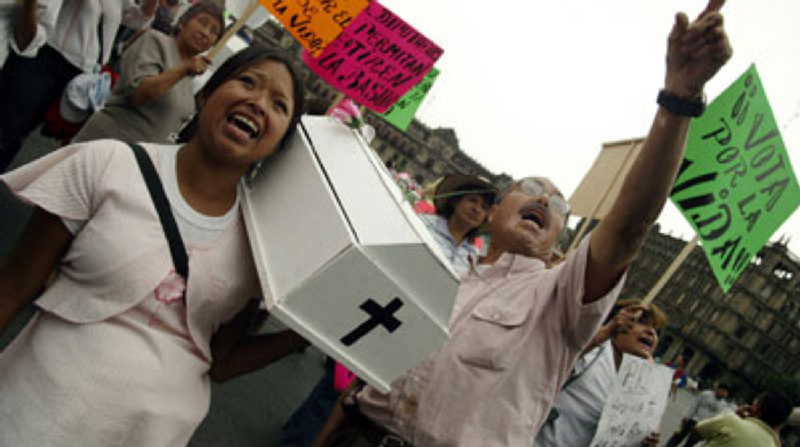A new conservative social movement? Latin America’s regional strategies to restrict abortion rights
How to cite this publication:
Camila Gianella Malca, Rachel Sieder, Angelica Peñas, Marta Rodriguez de Assis Machado (2017). A new conservative social movement? Latin America’s regional strategies to restrict abortion rights. Bergen: Chr. Michelsen Institute (CMI Brief 5)
Despite increased evidence of international lobbying groups working to restrict sexual and reproductive health and rights policies at international bodies such as the United Nations, little is known about transnational networks working at local level to restrict abortion rights, how they work, and if it is possible to describe regional strategies developed to restrict abortion rights.
This brief highlights some of the main strategies deployed to restrict the right to safe and legal abortion in Latin America. Challenging beliefs that movements towards restriction of abortion rights are local in character, it argues that – similar to the movement for the decriminalization of abortion – country movements against women’s abortion rights are part of regional alliances, and there is a high level of exchange amongst organizations from different countries.
Introduction
This brief is based on the results of the Centre on Law and Social Transformation’s project Abortion Rights Lawfare in Latin America financed by the Research Program on Latin America LATINAMERIKA of the Norwegian Research Council.
Abortion rights have long been highly controversial in Latin America. Civil society actors have adopted diverse legal and illegal, formal and informal strategies to engage legal institutions in order to further or halt policy reform and social change to advance or restrict abortion rights.
Resistance towards abortion in the region has been linked with religiosity. Historically Latin America has had a strong presence of the Catholic Church (about 40% of the world’s Roman Catholics live in the region), and Evangelical churches enjoy a rapidly growing presence. The prevailing official position of the Catholic Church is against abortion rights. The majority of Evangelical churches also oppose abortion. Indeed, in recent years in some countries (such as Brazil) conservative Evangelical churches have displaced the Catholic Church as leading actors in the opposition to abortion rights in the region.
However, despite widespread religiosity public opinion in the region does not favor the total banning of abortion. Countries with a total ban, like El Salvador and Nicaragua, however, do not follow this regional trend (see Graph 1).1 Different studies confirm that context and religious background influence people’s attitudes towards abortion: people living in countries where abortion is criminalized on all grounds, those who self-identify as Catholic or Evangelical, and those who say that religion is important in their lives, are less supportive of abortion rights.2 Studies also indicate that people in Latin America are more open to supporting abortion when they receive information about the women’s individual circumstances.3

Yet despite this evolution towards recognizing the need for decriminalization of abortion on some grounds, restrictions on access to safe and legal abortion in Latin America go well beyond what is prescribed by law. Although three of the five countries in the world that prohibit abortion under all circumstances are in Latin America (Chile, El Salvador and Nicaragua), it is also true that most of the countries in the region allow abortion under certain circumstances. Legal abortion upon request during the first 12 weeks of pregnancy is available in Cuba (since 1965), Mexico City (since 2007), and Uruguay (since 2012). Other countries allow abortion when the pregnancy constitutes a serious risk to the woman’s life or health (Argentina, Brazil, Colombia, Guatemala, Honduras, Panama, Paraguay, and Peru), when the pregnancy is the result of sexual abuse (Argentina, Brazil, Bolivia, Colombia, Ecuador, and Panama), and when fetal malformations make life outside the womb impossible (Colombia and Panama; Brazil in the case of anencephaly).
However, despite some degree of recognition of legal grounds for abortion, women across Latin America face often insurmountable barriers when seeking safe and legal abortion services, contributing to the high prevalence of unsafe abortions in the region. According to the most recent estimates, at least 10% of all maternal deaths annually in the region are due to unsafe abortions. Every year 760,000 women are treated for complications from unsafe abortions.
The legal strategies to keep or expand restrictions to safe and legal abortion
To identify the strategies used by actors involved in the struggles around abortion rights, the project Abortion Rights Lawfare in Latin America built a database with abortion rights events collected by the team of scholars and country experts. The database contains information from the six case study countries: Argentina, Brazil, Colombia, El Salvador, Mexico and Peru. It includes information from January 1990–August 2016.
In total, 306 events were identified: 133 were events to restrict abortion rights and 159 to advance the recognition of abortion rights (the remaining 14 were considered critical contextual events, such as presidential elections). Analysis of this data reveals that despite some shared strategies between groups supporting and opposing rights to legal and safe abortion, some strategies are exclusive to one side of the abortion war. Importantly, constitutional reforms and requirements to force political candidates to share their position on abortion have been exclusively used to restrict abortion rights.
Litigation in local courts has been an important strategy for groups opposing abortion rights, especially in El Salvador and Peru where judicial decisions have allowed the continuation of the criminalization of abortion, and banned distribution of the morning-after pill.
Another salient feature is the political power enjoyed by actors opposing the right to safe and legal abortion. These groups have demonstrated their ability to stage debates and obtain reforms within the legislative bodies, including constitutional reforms. This capacity to influence the legislative and executive branches has allowed the region-wide approval of a day to commemorate the unborn, which is now used in many countries as a central day for anti-abortion rallies, demonstrating the powerful symbolic effects of this type of initiative.
Adoption of official Day of the Unborn Child
El Salvador (1993)
Argentina (1998)
Guatemala (1999)
Nicaragua (2000)
Dominican Republic (2001)
Peru (2002)
Chile (2013)
Bills in the Congress: Mexico and Brazil.
Interestingly, social mobilization – including public demonstrations, collection of signatures and organization of campaigns – have been used both by groups in favor of advancing the expansion of abortion rights and those aiming to restrict these. Organizations also have shown a permanent interest in public opinion, participating in media debates and commissioning surveys.
Regarding changes over time, constitutional reforms in the 1990s included the rights of the unborn child as a strategy to block abortion rights. In recent years, groups opposing abortion rights have started to exert direct pressure over politicians during electoral campaigns. The data shows that in the last 10 years abortion rights have gained a saliency in political campaigns across the region, with conservative groups demanding that presidential candidates and those running for national and local legislatures publicly state their positions regarding abortion rights.
Another salient feature of the disputes is that they are not restricted only to bills addressing the right to abortion. Legal mobilization to restrict abortion rights has addressed other arenas to legally block or prevent the possibility of the expansion of abortion rights. This has been effected through bills and reforms of Children`s Codes to include the recognition of the unborn as a child, passing bills and legislation to ban stem cell research, euthanasia, or in- vitro fertilization, as well as by banning any reference to sexual and reproductive rights in national human rights plans.
Adoption of Children’s Code recognizing beginning of life since conception
Colombia (1990)
Peru (1992 and 2000 )
Bolivia (1999)
Costa Rica (1998)
Conclusions
Our analysis has allowed us to identify different strategies used by the actors favoring the criminalization of abortion in Latin America, and to show the diffusion of strategies across the region. Country actors have used similar legal strategies to advance criminalization and/or to prevent the decriminalization of abortion. Our results indicate that the movement against abortion rights in Latin America is a regional movement with some level of coordination allowing actors involved to exchange experiences and knowhow. This can be seen in the development of similar strategies, such as acting in the same arenas (national human rights plans, reforms of Children’s Codes), but also through the use of similar legal arguments, including adopting human rights discourses and framings, sharing the same interpretation of international human rights treaties (such as the Inter-American Pact of Human Rights, International Convention of Children Rights), or by quoting and presenting the same scientific evidence to support their arguments.
Analysis of the strategies used by the actors opposed to abortion reveals the political power enjoyed by these actors, and in general the movement against the decriminalization of abortion in Latin America. The courts are not an unfamiliar arena for these actors, however, their political power allows the use of the legislative and executive branches as their main arenas of dispute. Conservative Evangelical leaders have taken advantage of the broader regional context of corroding public trust in political parties and low levels of confidence in democratic institutions in order to mobilize the votes of their followers in exchange for the parties’ backing for conservative positions. Although the conservative backlash against abortion rights is by no means hegemonic, the increasing coordination of regional strategies and the broader political and electoral context in many countries mean that the struggle to defend women’s sexual and reproductive rights has assumed a new urgency.

References
1. Corporación Latinobarómetro. Informe 2016. Buenos Aires: Corporación Latinobarómetro, 2016.
2. Minkenberg M. Religion and Pubic Policy: Institutional, Cultural, and Political Impact on the Shaping of Abortion Policies in Western Democracies. Comparative Political Studies 2002; 35: 221–47.
3. Yam E, Dries-Daffner I, García SG. Abortion opinion research in Latin America and the Caribbean: a review of the literature. Studies in Family Planning 2006; 37(4): 225–40.



